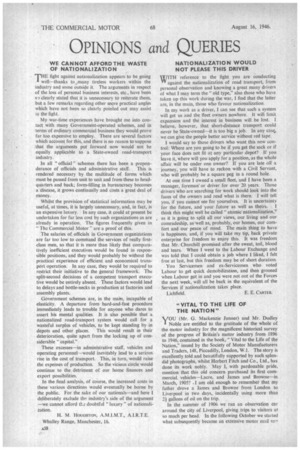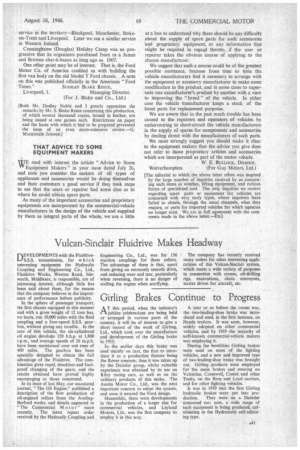• OPINIONS and QUERIES
Page 40

Page 43

If you've noticed an error in this article please click here to report it so we can fix it.
WE CANNOT AFFORD THE WASTE OF NATIONALIZATION NATIONALIZATION WOULD NOT PLEASE THIS DRIVER
THE fight against nationalization appears to be going A well—thanks to many tireless workers within the industry and some outside it. The arguments in respect of the loss of personal business interests, etc., have been S .) clearly stated that it is unnecessary to reiterate them, but a few remarks regarding other more practical angles which have not been so clearly pointed out may assist in the fight.
My war-time experiences have brought me into contact with many Government-operated schemes, and in terms of ordinary commercial business they would prove far too expensive to employ. There are several factors which account for this, and there is no reason to suppose that the arguments put forward now would not he equally applicable to a State-owned road-transport industry.
In all " official " schemes there has been a prepon derance of officials and administrative staff. This is rendered necessary by the multitude of forms which must be passed from unit to unit and from these to headquarters and back; form-filling in bureaucracy becomes a disease, it grows continually and costs a great deal of money.
Whilst the provision of statistical information may be useful, at times, it is largely unnecessary, and, in fact, is an expensive luxury. In any case, it could at present be undertaken for far less cost by such organizations as are already in operation. The figures frequently given in " Thz Commercial Motor" are a proof of this.
The salaries of officials in Government organizations are far too low to command the services of really firstclass men, so that it is more than likely that comparatively inefficient executives would be found in responsible positions, and they would probably be without the practical experience of efficient and economical transport operation. In any case, they would be required to restrict their initiative to the general framework. The split-second decisions of a competent transport executive would be entirely absent. These factors would lead to delays and bottle-necks in production at factories and assembly plants.
Government schemes are, in the main, incapable of elasticity. A departure from hard-and-fast procedure immediately leads to trouble for anyone who dares to assert his mental qualities. It is also possible that a nationalized road-transport system would call for a wasteful surplus of vehicles, to be kept standing by in depots and other places. This would result in their deterioration, quite apart from the locking up of considerable "capital."
These excesses—in administrative staff, vehicles and operating personnel—would inevitably lead to a serious rise in the cost of transport. This, in turn, would raise the expenses of production. So the vicious circle would continue to the detriment of our home finances and export possibilities.
In the final analysis, of course, the increased costs in these various directions would eventually be borne by the public. For the sake of our nationals—and here I deliberately exclude fits; industry's side of the argument —we cannot afford ft.:: doubtful "luxury" of nationalization.
H. M. HOUGHTON, A.M.I.M.T., A.I.R.T.E. Whalley Range, Manchester, 16. WITH reference to the fight you are conducting " a g a in st the nationalization of road transport, from personal observation and knowing a great many drivers of what I may term the "old type," also those who have taken up this work during the war, I find that the latter are, in the main, those who favour nationalization.
In my work as a driver, I can see that such a system will get us and the fleet owners nowhere. It will limit expansion and the interest in business will be lost. I believe, however, that short-distance transport could never be State-owned—it is too big a job. In any can, we can give the people better service without red tape.
1 would say to those drivers who want this new control: Where are you going to be if you get the sack or if your face does not fit at any particular depot? If you leave it, where will you apply for a position, as the whole affair wilt be under one owner? If you are late off a journey, you will have to reckon with a Civil Servant, who will probably be a square peg in a round hole.
At one time I owneda small fleet, and I have been a manager, foreman' or driver for over 20 years. Those drivers who are searching for work should look into the faces of the owners and read what is there. I will tell you, if you cannot see for yourselves. It is uncertainty
for the future, and your future as well as theirs. I think this might well be called "atomic nationalization," , as it is going to split all our _views, our living and our comradeship, as well as, probably, our homes, our comfort and our peace of mind. The main thing to have is happiness, and, if you will take my tip, back private enterprise for freedom to enjoy this. It was freedom. that Mr. Churchill promised after the sweat, toil, blood and tears. When I went to the Labour Exchange and was told that I could obtain a job where I liked, I felt free at last, but this freedom may be of short duration.
You Servicemen and ex-Servicemen who voted Labour to get quick demobilization, and then groused when Labour got in and you were not out of the Forces the next week, will all be back in the equivalent of the Services if nationalization takes place.
Lichfield. E. E. CARTER.
"VITAL TO THE LIFE OF THE NATION"
yOU (Mr. G. Mackenzie Junner) and Mr. Dudley Noble are entitled to the gratitude of the whole of the motor industry for the magnificent historical survey of the progress of Britain's motor industry from 1896 to 1946, contained in the book, " Vital to the Life of the Nation," issued by the Society of Motor Manufacturers and Traders, 148, Piccadilly, London, W.I. The story is excellently told and beautifully supported by such splendid photographs, whilst Herbert Fitch and Co., Ltd., has done its work nobly. May L with pardonable pride, mention that this old concern purchased its first commercial vehicles—Lacre, and James and Browne—in March, 1905? .I am old enough to remember that my father drove a James and Browne from London to Liverpool in two days, incidentally using more than 2i gallons of oil on the trip.
In the summer of 1906 we ran an observation car around the city of Liverpool, giving trips to visitors at so much per head. In the following October we started what subsequently became an extensive motor mail vo
service in the territory—Blackpool, Manchester, Stokeon-Trent and Liverpool. Later we ran a similar service in Western Ireland.
Cunninghams (Douglas) Holiday Camp was so progressive that its organizers purchased front us a James and Browne char-5.-bancs as tong ago as 1907.
One other point may be of interest. That is, the Ford Motor Co. of America credited us with building the first van body on the old Model T Ford chassis. A note on this was published officially in the American "Ford 'Times." STANLEY BLAKE REECE, Liverpool, 1. Managing Director. (For J. Blake and Co., Ltd.) [Both Mr. Dudley Noble and I greatly appreciate the remarks by Mr. S. Blake Reece concerning this ptoduction, of which several thousand copies, bound in leather, are being issued at one guinea each. Restrictions on paper and the haste with which it had to be prepared prevented the issue of an even more-extensive review.—G.
ACKENZIE JUNNER.]
THAT ADVICE TO SOME EQUIPMENT MAKERS WE read with interest the article "Advice to Some " Equipment Makers" in your issue dated July 26, and note you consider the makers of all types of appliances and accessories would be doing themselves and their customers a good service if they took steps to see that the users or repairer had some clue as to where he could obtain spare parts.
As many of the important accessories and proprietary equipments are incorporated by the commercial-vehicle manufacturers in the design of the vehicle and supplied by them as integral parts of the whole, we are a little at a loss to understand why there should be any difficulty about the supply of spare parts for such accessories and proprietary equipment, or any information that Might be required in regars1 thereto, if the user or repairer takes the obvious course of applying to the chassis manufacturer.
We suggest that such a course could be of the greatest possible assistance, because from time to time the vehicle manufacturers find it necessary to arrange with the equipment or accessory manufacturer to make some modification in the product, and in some cases to supersede one manufacturer's product by another with a view to improving the " breed " of the vehicle. In either case the vehicle manufacturer keeps a stock of the latest parts for replacement purposes.
We are aware that in the past much trouble has been caused to the repairers and operators of vehicles by. endeavouring to short-circuit the vehicle manufacturers in the supply of spares for components and accessories by dealing direct with the manufacturers of such parts.
We most strongly suggest you should make it clear to the equipment makers that the advice you give does not refer to those proprietary articles and accessories which are incorporated as part of the motor vehicle.
W. E. BULLOCK, Director.
Wolverhampton. (For Guy Motors, Ltd.)
[The editorial to which the above letter refers was inspired by the large number of inquiries received by us concerning such items as winches, lifting equipment, and various forms of specialized tool. The only inquiries we receive regarding spare parts or equipment for vehicles are concerned with very _early types, where inquirers have failed to obtain, through the usual channels, what they require, or parts for imported vehicles for which agencies no longer exist. We are in full agreement with the comments made in the above letter.---ED.1




































































